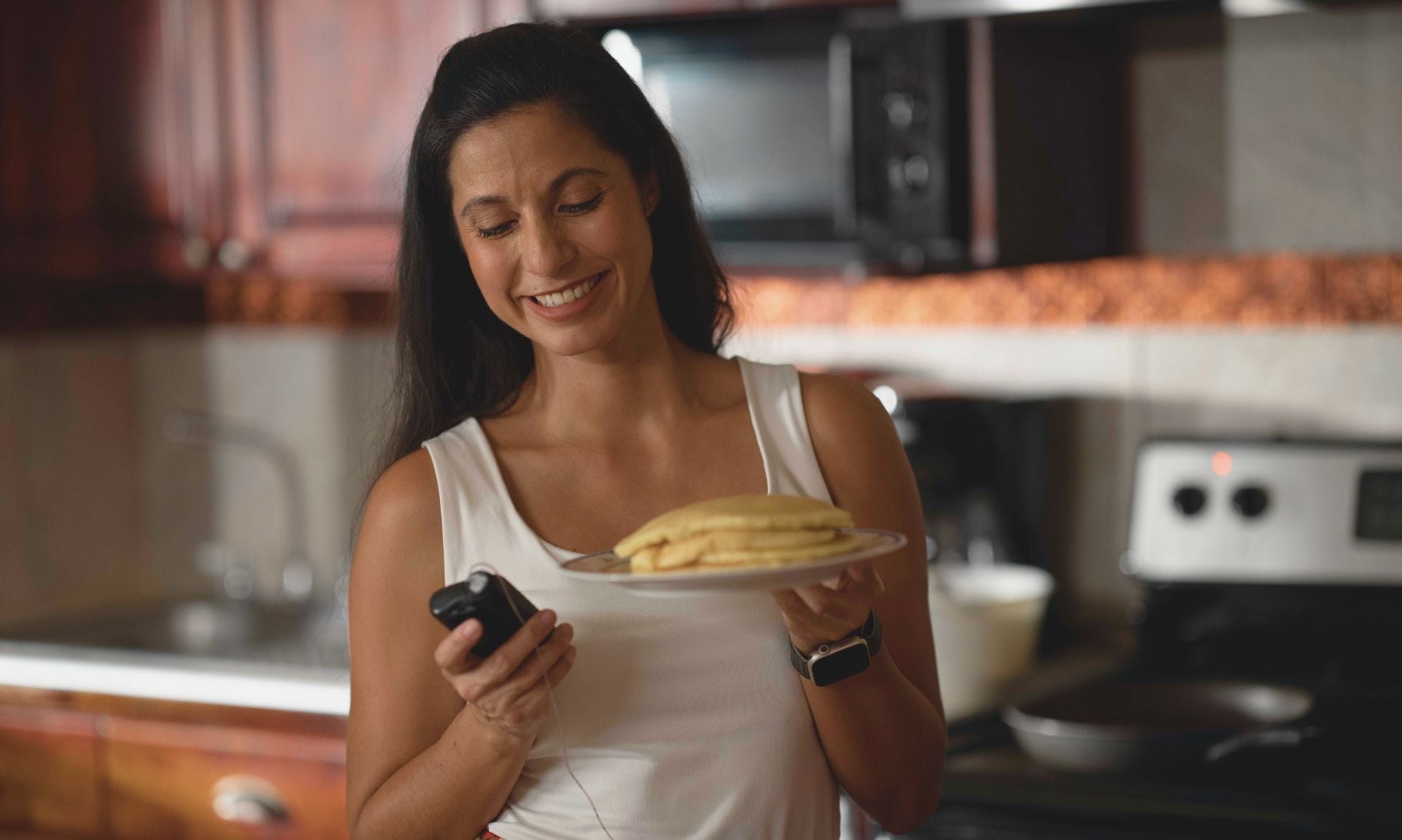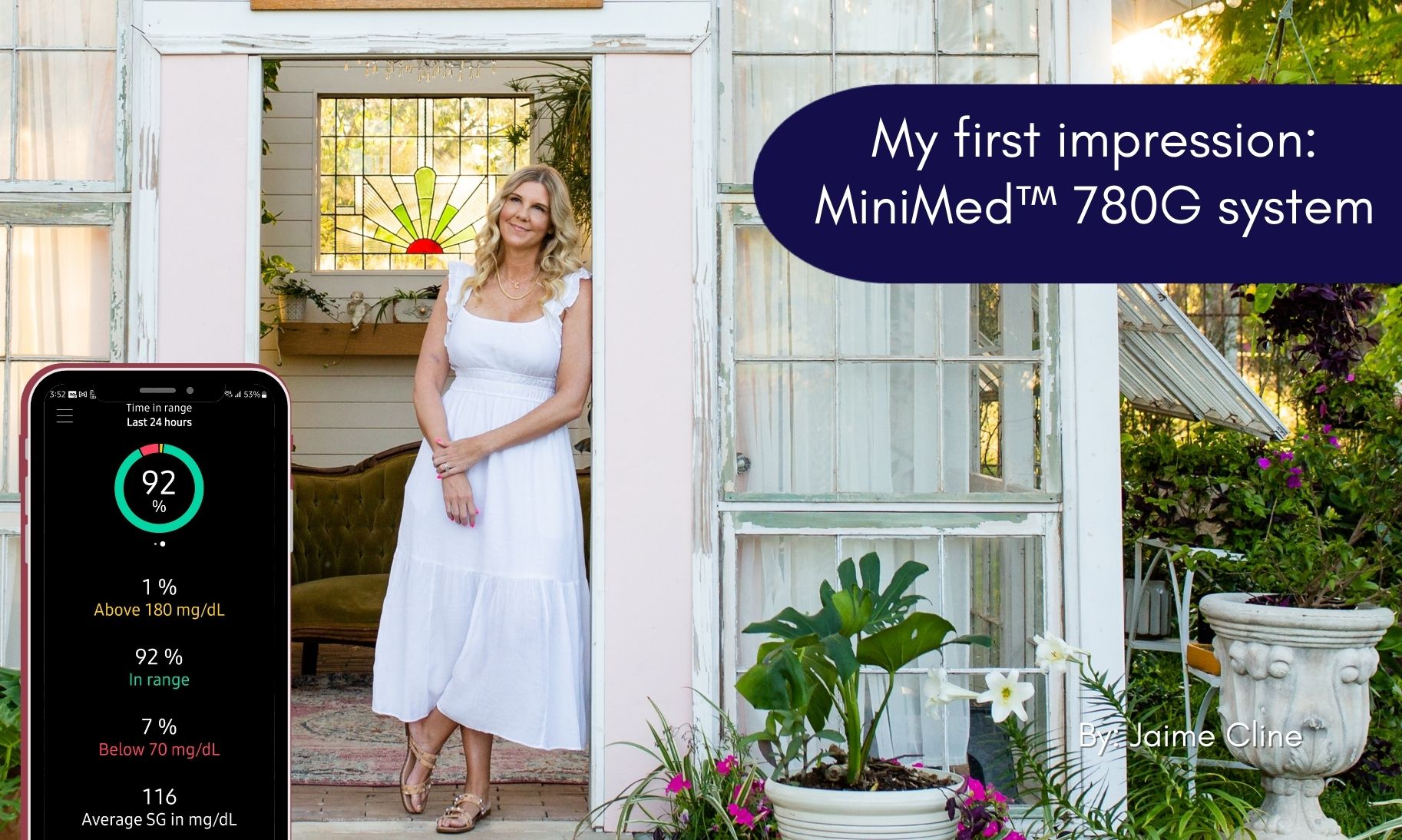What is Meal Detection™ technology?

Wake up. Correct high from dawn phenomenon. Calculate carbs for breakfast. Deliver bolus. Check sugar levels. Calculate. Deliver. Check. Calculate some more and deliver again.
Life with diabetes is filled with a constant series of decisions and mental math, especially around mealtime. Your diabetes technology should be your partner in relieving some of that burden so you can get back to focusing on the things you enjoy. The MiniMed™ 780G system is the only system with Meal Detection™ technology, which helps make managing diabetes easier.
What is Meal Detection™ technology?
Meal Detection™ technology is an advanced feature that uses current and past sugar trends to detect a missed meal dose.* Picture this: you’re at a sporting event and super excited to see your team play. You’re busy watching the game when your friend hands you an overpriced hot dog and drink, which you happily enjoy in between rooting for the home team. Oh wait – you forgot to bolus! If the system detects a meal (based on the rapid rise of your sugar levels), it will automatically§ deliver correction doses while sugar levels are rising, up to every 5 minutes, to help bring you back to target.
With the MiniMed™ 780G system, you get game time back without missing a beat.
Real people. Real results.
What do you feel is one of the hardest aspects of managing diabetes? If you answered carb counting, then you’d be part of the 50 percent of people with diabetes who think so too.1 In fact, it’s so challenging that people with type 1 diabetes underestimate carb counts about 63 percent of the time.2 Imagine hosting a party when you haven't accounted for more than half the guests who show up — the unexpected change might just throw all your carefully made plans off!
If carbs are underestimated, then after eating, sugar levels can increase way above target range (hyperglycemia). The MiniMed™ 780G system with Meal Detection™ technology is designed to detect rapid rises of sugar levels and then deliver auto correction doses every 5 minutes to keep levels within a healthy range.
In the sample graph, you can see the real results of a person in a pivotal trial. Due to inherent study limitations, caution is advised when attempting to extrapolate these results to new patients. There could be significant differences.
Due to inherent study limitations, caution is advised when attempting to extrapolate these results to new patients. There could be significant differences.
This person ate a high-carb meal and missed a meal dose, but with Meal Detection™ technology, the MiniMed™ 780G system automatically delivered 8 correction doses to keep them in a healthy range. Without this technology, that person went severely out of range 60 minutes after missing a meal dose. This is just one of many examples actual users of the MiniMed™ 780G system are experiencing.
Meal Detection™ technology and the MiniMed™ 780G system outperforms the competition
To understand how revolutionary Meal Detection™ technology is, you first need to know the history of this algorithm: SmartGuard™ technology. In 2017, Medtronic introduced the world’s first insulin pump system to automatically adjust background (basal) insulin based on sensor glucose (SG) values received by the integrated CGM. This pump used SmartGuard™ technology.
Today, there are other insulin pumps that can adjust background insulin as well. However, only the MiniMed™ 780G system has Meal Detection™ technology that detects sugar level spikes every 5 minutes and drives automatic action to deliver 100 percent of calculated correction boluses.
Tandem with Control-IQ3 may be able to deliver auto correction boluses, but it is limited to just once per hour and delivers only 60 percent of calculated correction bolus. The “microboluses” from OmniPod® provide background insulin delivery every 5 minutes, but corrections from miscalculated doses must be initiated by the user.4
See how the MiniMed™ 780G system with the amazing Meal Detection™ technology compares:

Designed for real life
Our customers asked us to simplify the experience around snacks and mealtime. Carb counting is hard. That’s why Meal Detection™ technology was designed — to meet the needs of real life. When equipped with the full MiniMed™ 780G system, you not only get forgiveness for miscalculated or occasionally missed meal doses, but more confidence to focus on things you enjoy. Don’t just take our word for it. Even Medtronic Champion Marguerite, switched from her tubeless pump to the MiniMed™ 780G system because of her favorite auto correction feature.
"One of my favorite features is, first and foremost, auto correction. It gives me confidence..." - Marguerite, #MedtronicChampion
References:
* Taking a bolus 15–20 minutes before a meal helps to keep blood sugar levels under control after eating.
§ Refers to SmartGuard™ feature. Individual results may vary.
1 Data on file. Medtronic. Northridge, CA. Survey data AHCL Positioning Concept Test, 2019.
2 Brazeau AS, Mircescu H, Desjardins K, et al. Carbohydrate counting accuracy and blood glucose variability in adults with type 1 diabetes. Diabetes Res Clin Pract. January 2013;99(1):19-23.
3 T:slim X2™ with control IQ user guide
4 Omnipod® 5 user guide.
Important safety information: MiniMed™ 780G system with SmartGuard™ technology with Guardian™ 4 sensor
The MiniMed™ 780G system is intended for continuous delivery of basal insulin at selectable rates, and the administration of insulin boluses at selectable amounts for the management of type 1 diabetes mellitus in persons seven years of age and older requiring insulin as well as for the continuous monitoring and trending of glucose levels in the fluid under the skin. The MiniMed™ 780G system includes SmartGuard™ technology, which can be programmed to automatically adjust insulin delivery based on the continuous glucose monitoring (CGM) sensor glucose values and can suspend delivery of insulin when the sensor glucose (SG) value falls below or is predicted to fall below predefined threshold values.
The Medtronic MiniMed™ 780G system consists of the following devices: MiniMed™ 780G insulin pump, the Guardian™ 4 transmitter, the Guardian™ 4 sensor, One-press serter, the Accu-Chek™ Guide Link blood glucose meter, and the Accu-Chek™ Guide test strips. The system requires a prescription from a healthcare professional.
The Guardian™ 4 sensor is intended for use with the MiniMed™ 780G system and the Guardian 4 transmitter to monitor glucose levels for the management of diabetes. The sensor is intended for single use and requires a prescription. The Guardian™ 4 sensor is indicated for up to seven days of continuous use.
The Guardian™ 4 sensor is not intended to be used directly to make therapy adjustments while the MiniMed™ 780G is operating in manual mode. All therapy adjustments in manual mode should be based on measurements obtained using a blood glucose meter and not on values provided by the Guardian™ 4 sensor. The Guardian™ 4 sensor has been studied and is approved for use in patients ages 7 years and older and in the arm insertion site only. Do not use the Guardian™ 4 sensor in the abdomen or other body sites including the buttocks, due to unknown or different performance that could result in hypoglycemia or hyperglycemia.
WARNING: Do not use the SmartGuard™ feature for people who require less than 8 units or more than 250 units of total daily insulin per day. A total daily dose of at least 8 units, but no more than 250 units, is required to operate in the SmartGuard™ feature. |
WARNING: Do not use the MiniMed™ 780G system until appropriate training has been received from a healthcare professional. Training is essential to ensure the safe use of the MiniMed™ 780G system.
WARNING: Do not use SG values to make treatment decisions, including delivering a bolus, while the pump is in Manual Mode. When the SmartGuard™ feature is active and you are no longer in Manual Mode, the pump uses an SG value, when available, to calculate a bolus amount. However, if your symptoms do not match the SG value, use a BG meter to confirm the SG value. Failure to confirm glucose levels when your symptoms do not match the SG value can result in the infusion of too much or too little insulin, which may cause hypoglycemia or hyperglycemia.
Pump therapy is not recommended for people whose vision or hearing does not allow for the recognition of pump signals, alerts, or alarms. The safety of the MiniMed™ 780G system has not been studied in pregnant women, persons with type 2 diabetes, or in persons using other anti-hyperglycemic therapies that do not include insulin. For complete details of the system, including product and important safety information such as indications, contraindications, warnings and precautions associated with system and its components, please consult https://www.medtronicdiabetes.com/important-safety-information#minimed-780g and the appropriate user guide at https://www.medtronicdiabetes.com/download-library



